MIT Lesson 12 Kanji: �$BBh#1#22]$N4A;z�(B
 Each large,
brush-stroke image below which shows up as a hypertext link (e.g. has a colored
box around it) is a link to a 1 Megabyte (or less) QuickTime movie of the character
being painted with a brush.
Each large,
brush-stroke image below which shows up as a hypertext link (e.g. has a colored
box around it) is a link to a 1 Megabyte (or less) QuickTime movie of the character
being painted with a brush.
JP NET is grateful to Prof. Saeko Komori
of Chubu University for
permission to use the kanji movies at our site. All movie data is
copyright 1995, 1996 by Saeko Komori.
In the following definitions, on (Chinese-based) readings
are represented by katakana, and by capital romaji letters;
kun (native Japanese-based) readings are represented by
hiragana, and by lower-case romaji letters. This is a common
dictionary convention, and does not have any bearing on meaning.
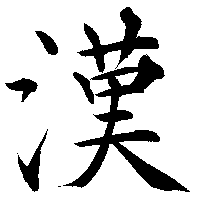
- Printed form:
- �$B4A�(B
- Readings:
- �$B%+%s�(B
- KAN
- Meaning:
- Han dynasty
- Mnemonic:
- The kanji came to Japan at the time of Hay dynasty in China.
The water radical on the left, the grass symbol on top, mouth �$B8}�(B and
multiple men �$BIW�(B.
- Usage Examples:
- �$B4A;z�(B (�$B$+$s$8�(B) Chinese characters
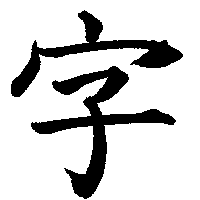
- Printed form:
- �$B;z�(B
- Readings:
- �$B%8�(B
- JI
- Meaning:
- letter; character
- Mnemonic:
- There is a child learning alphabets under the roof.
- Usage Examples:
- �$B$9$&;z�(B (�$B$9$&$8�(B) numbers
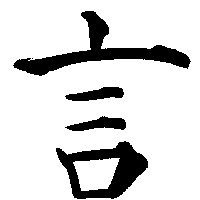
- Printed form:
- �$B8@�(B
- Readings:
- �$B$$�(B(�$B$&�(B)
- i
- Meaning:
- to say
- Mnemonic:
- Sound waves coming out from the mouth �$B8}�(B.
- Usage Examples:
- �$B8@$&�(B (�$B$$$&�(B) say
- �$B8@$C$F2<$5$$�(B (�$B$$$C$F$/$@$5$$�(B) Please say it.
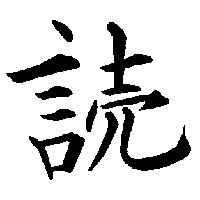
- Printed form:
- �$BFI�(B
- Readings:
- �$B$h�(B(�$B$`�(B)
- yo
- Meaning:
- to read
- Mnemonic:
- The word radical �$B8@�(B and the kanji �$BGd�(B "to sell".
- Usage Examples:
- �$BFI$`�(B (�$B$h$`�(B) read
- �$BFI$_$^$7$?�(B (�$B$h$_$^$7$?�(B) (I) read it.
- �$BFI$s$G$$$^$9�(B (�$B$h$s$G$$$^$9�(B) (I'm) reading it.
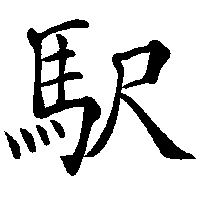
- Printed form:
- �$B1X�(B
- Readings:
- �$B$($-�(B
- eki
- Meaning:
- station
- Mnemonic:
- Horse �$BGO�(B and measurement �$B<\!%!!!!�(B
- Usage Examples:
- �$B1X�(B (�$B$($-�(B) station
- �$BEl5~1X�(B (�$B$H$&$-$g$&$($-�(B) Tokyo Station
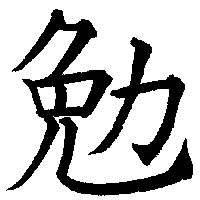
- Printed form:
- �$BJY�(B
- Readings:
- �$B%Y%s�(B
- BEN
- Meaning:
- self-exertion
- Mnemonic:
- Power �$BNO�(B to draw out �$BLH�(B. [�$BCK�(B(�$B$*$H$3�(B)"man"]
- Usage Examples:
- �$BJY6/�(B (�$B$Y$s$-$g$&�(B) study
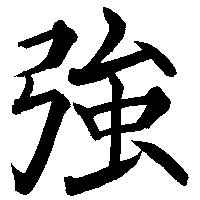
- Printed form:
- �$B6/�(B
- Readings:
- �$B$D$h�(B(�$B$$�(B)/�$B%-%g%&�(B
- tsuyo/KYOO
- Meaning:
- strong
- Mnemonic:
- Bow �$B5]�(B and insect �$BCn�(B under your nose �$B%`!*�(B
- Usage Examples:
- �$B6/$$�(B (�$B$D$h$$�(B) strong
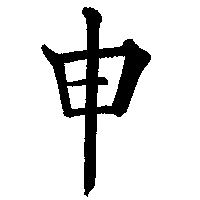
- Printed form:
- �$B?=�(B
- Readings:
- �$B$b$&�(B(�$B$9�(B)
- moo
- Meaning:
- to say (humbly)
- Mnemonic:
- Words passing through the lips �$BF|�(B. [�$BCf�(B(�$B$A$e$&�(B)"middle"]
- Usage Examples:
- �$B?=$9�(B (�$B$b$&$9�(B) say (humbly)
- �$B?=$7$o$1$J$$�(B (�$B$b$&$7$o$1$J$$�(B) I'm sorry.
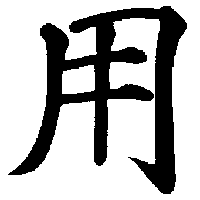
- Printed form:
- �$BMQ�(B
- Readings:
- �$B%h%&�(B
- YOO
- Meaning:
- matters to attend to
- Mnemonic:
- This business nees many moons �$B7n�(B to complete.
- Usage Examples:
- �$BMQ;v�(B (�$B$h$&$8�(B) matters to attend to
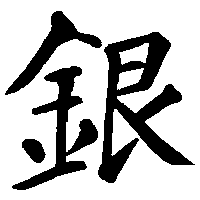
- Printed form:
- �$B6d�(B
- Readings:
- �$B%.%s�(B
- GIN
- Meaning:
- silver
- Mnemonic:
- I am going to the bank to get money �$B6b�(B to buy some food �$B?)�(B.
- Usage Examples:
- �$B6d9T�(B (�$B$.$s$3$&�(B) bank
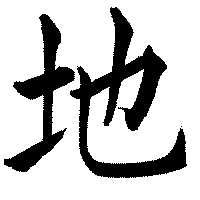
- Printed form:
- �$BCO�(B
- Readings:
- �$B%A�(B
- CHI
- Meaning:
- ground
- Mnemonic:
- A snake �$BLi�(B crawling on the ground �$BEZ�(B.
- Usage Examples:
- �$BCO?^�(B (�$B$A$:�(B) map
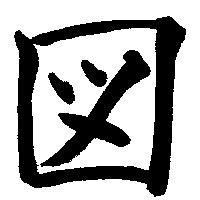
- Printed form:
- �$B?^�(B
- Readings:
- �$B%:�(B
- ZU
- Meaning:
- map; to plan
- Mnemonic:
- A square piece of paper with roads and buildings indicated.
- Usage Examples:
- () map
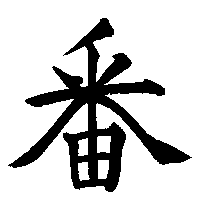
- Printed form:
- �$BHV�(B
- Readings:
- �$B%P%s�(B
- BAN
- Meaning:
- numerical order
- Mnemonic:
- Scattering rice grains �$BJF�(B over rice fields �$BED�(B.
- Usage Examples:
- �$BHV9f�(B (�$B$P$s$4$&�(B) number
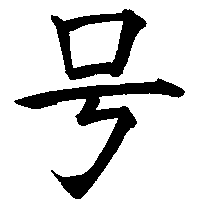
- Printed form:
- �$B9f�(B
- Readings:
- �$B%4%&�(B
- GOO
- Meaning:
- numerical designation
- Mnemonic:
- You have just been called out �$B8}�(B, "No. 5 person, please come in."
- Usage Examples:
- �$BEEOCHV9f�(B (�$B$G$s$o$P$s$4$&�(B) telephone number
- New Readings:
- �$BCfED$5$s�(B (�$B$J$+$?$5$s�(B/�$B$J$+$@$5$s�(B) (Mr/Ms) Nakata/Nakada
- �$BL@F|�(B (�$B$_$g$&$K$A�(B/�$B$"$7$?�(B) tomorrow
- �$BL@8eF|�(B (�$B$_$g$&$4$K$A�(B/�$B$"$5$C$F�(B) the day after tomorrow
- �$B8e$[$I�(B (�$B$N$A$[$I�(B) later
[J3 Kanji]
 Each large,
brush-stroke image below which shows up as a hypertext link (e.g. has a colored
box around it) is a link to a 1 Megabyte (or less) QuickTime movie of the character
being painted with a brush.
Each large,
brush-stroke image below which shows up as a hypertext link (e.g. has a colored
box around it) is a link to a 1 Megabyte (or less) QuickTime movie of the character
being painted with a brush.  Each large,
brush-stroke image below which shows up as a hypertext link (e.g. has a colored
box around it) is a link to a 1 Megabyte (or less) QuickTime movie of the character
being painted with a brush.
Each large,
brush-stroke image below which shows up as a hypertext link (e.g. has a colored
box around it) is a link to a 1 Megabyte (or less) QuickTime movie of the character
being painted with a brush. 












